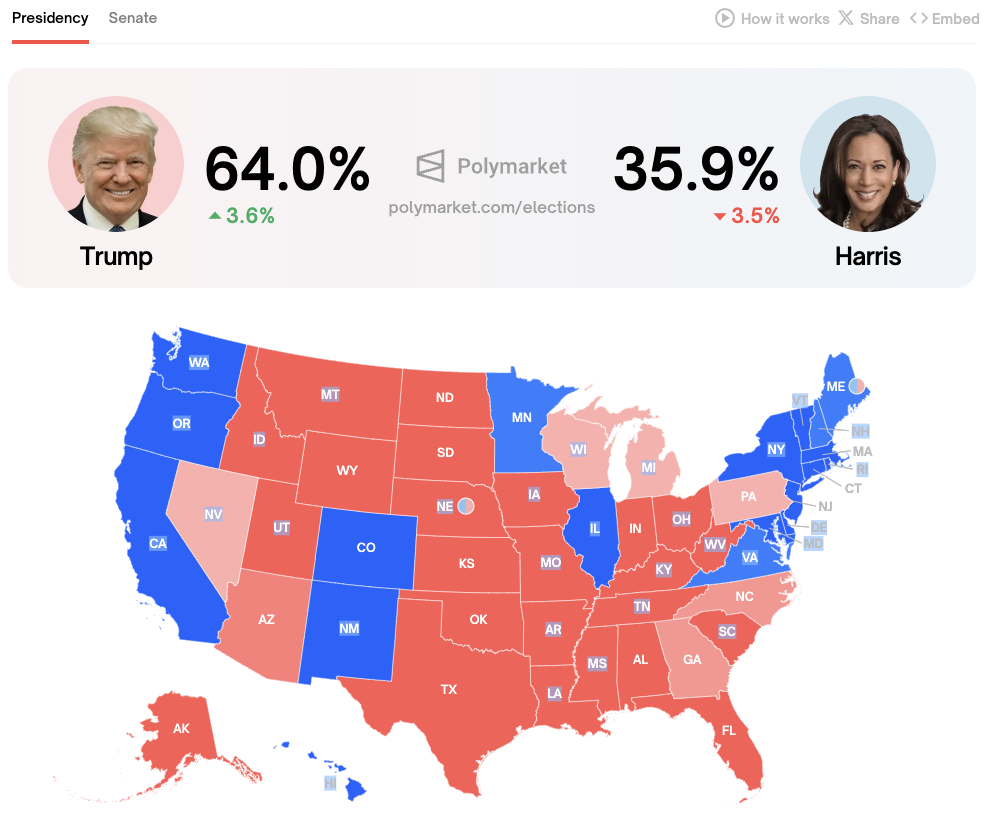With less than 15 days until the US presidential election, the latest data from the well-known on-chain prediction market Polymarket shows that former US President and Republican presidential candidate Donald Trump, who has publicly supported cryptocurrencies multiple times this year, currently has a 64% chance of winning, further widening his lead over Democratic candidate Kamala Harris. Harris' chance of winning has dropped to 35.9%, a new high for Trump since Biden's withdrawal in late July.
Currently, the betting volume on Polymarket's US presidential election market has surged to $2.2 billion, more than doubling since the end of September. Of this, over $700 million has been bet on Trump, while over $447 million has been bet on Harris, with the remaining roughly $1 billion in bets placed on other politicians.

Taiwan Bans Polymarket Election Betting
However, the legality of on-chain prediction markets is highly controversial, especially when it comes to election betting, which may violate election-related laws. Earlier this year, during Taiwan's presidential election, Polymarket set up on-chain betting related to the Taiwanese election, attracting over $3.78 million in bets, which caught the attention of prosecutors and police. Subsequently, on the grounds of violating the Election and Recall Act, prosecutors arrested more than 30 bettors across Taiwan within just two months, and the legal consequences for one individual have already been announced.
The US Commodity Futures Trading Commission (CFTC) has also continued to signal that they are closely monitoring Polymarket and other offshore prediction markets to ensure they comply with US laws, and will take legal action if necessary. Just yesterday (22nd), CFTC Chairman Rostin Behnam submitted a legislative wish list to Congress, calling for concrete action on cryptocurrency regulation and election betting.
CFTC Calls for Legislative Oversight of Election Betting
According to The Block, Behnam argued at the Securities Industry and Financial Markets Association (SIFMA) annual conference that Congress should take legislative action on election betting:
We have consistently viewed event contracts related to elections as being illegal, and this type of betting puts the entity in the position of being an "election cop".
This is a classic area where I think Congress should actually step in.
In a discussion at the Georgetown Psaros Center for Financial Markets and Policy at the end of September, Behnam stated that they will ensure the activities of offshore prediction markets like Polymarket are legal for US customers. If an entity has a large enough "footprint" in the US and has not registered its derivative contracts, it will face enforcement action. He emphasized:
Whether it's Polymarket or any other entity, if they're violating the law, the regulators will exercise their civil enforcement authority to stop the misconduct.
CFTC Files Another Appeal
In fact, the CFTC has been eyeing prediction market cases for some time. Over the past year, the CFTC has been in a legal battle with the prediction market Kalshi, arguing that the commission believes Kalshi should not offer election contracts, claiming it "violates the public interest".
Kalshi filed a lawsuit in November 2023. Subsequently, last month, US District Judge for the District of Columbia Jia M. Cobb ruled that the CFTC had exceeded its statutory authority in trying to prevent Kalshi from offering election contracts. The CFTC quickly appealed the ruling, but was ultimately rejected by the federal appeals court on October 2.
The CFTC took its latest action last week on the 16th, further arguing in its appeal that the judge's decision was wrong and requesting that the judgment be overturned.







